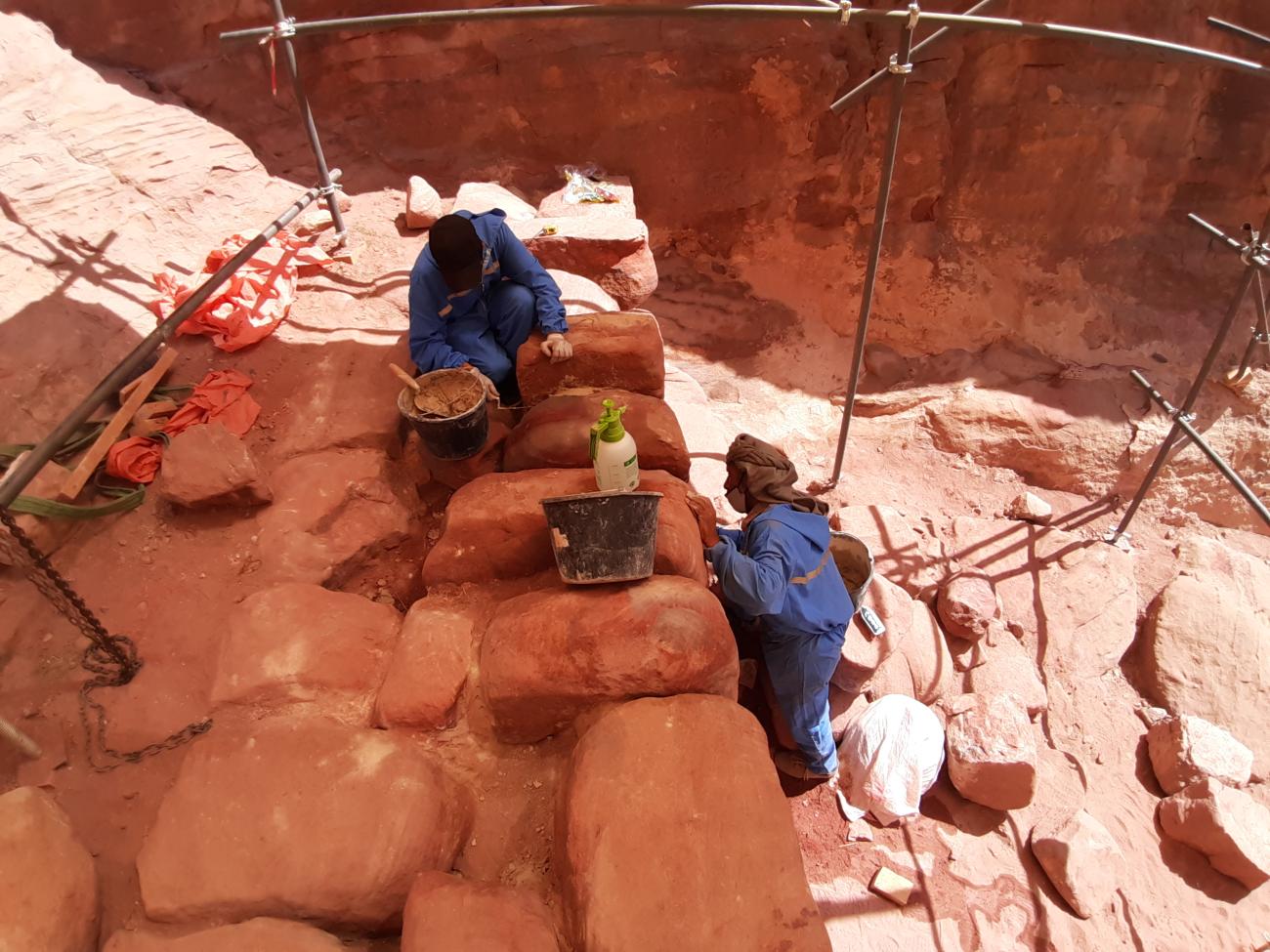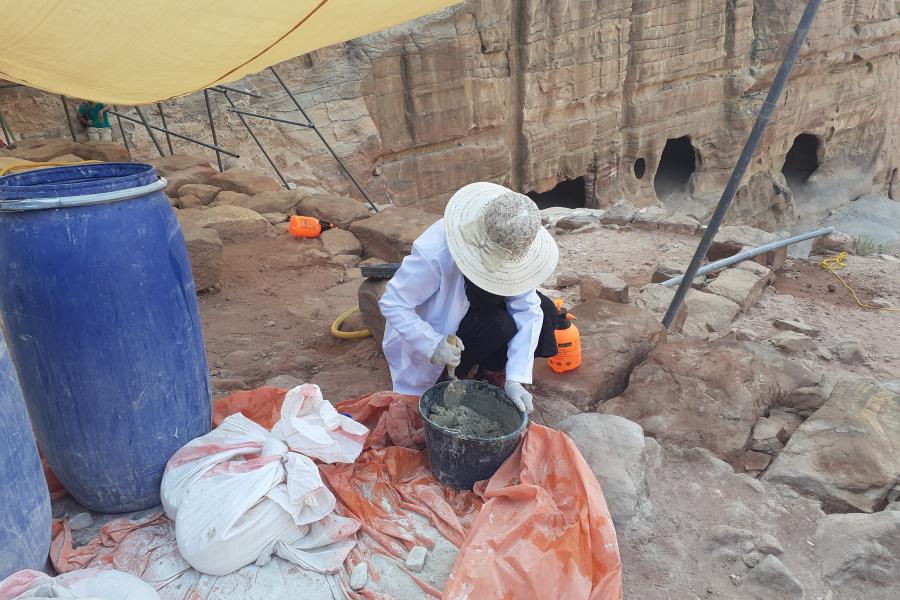Innovative project creates inclusive job opportunities for heritage sites preservation during Covid-19 pandemic in Petra

Under the overall leadership of the PDTRA, the project in Petra aims at creating 112 job opportunities for skilled and semiskilled workers over six months.
After a busy morning of work along the back-trail to the Monastery in Petra, Yousef Ahmed Hasanat took a break in the shade to share some tea with us, and to talk about his background and the project he is working on.
Yousef is 23 years old from Wadi Musa and is currently taking part in the Cash-for-Work mechanism of UNESCO project, “Employment Opportunities for Cultural Heritage Safeguarding in Jordan”. This project focuses on providing employment opportunities to vulnerable individuals, while at the same time contributing to the preservation of cultural heritage assets in two sites in Jordan.
Being a person living with Down Syndrome, Yousef explains that he faced challenges in finding training or job opportunities, but this changed when he saw the vacancy announcement for the UNESCO project. He is very happy to work on this project and pleased to be part of a team. He believes that the job opportunities provided from this project are a great benefit for the community as a whole, especially during these uncertain times.
“I heard about a job opportunity in the back trail and inside Petra so I applied to have a salary and be employed” Yousef says, “and before this I was just staying home”. This project gave Yousef the opportunity to gain work experience and particularly in Petra.
Originally unfamiliar with UNESCO and its mandate, Yousef is now learning more about the UNESCO project and its objectives. During this time, he has been working on and learning about preserving the cultural heritage of Petra.
"This project addresses two key priorities. First, it is about people, and providing them with productive jobs and new skills that they can use for future employment at this very critical time. Second, it’s about culture, as this project seeks to empower people in the local communities with the skills needed to be active members in the safeguarding of their cultural heritage", said Giorgia Cesaro, Project Officer at the UNESCO Amman Office.
Yousef, as part of a larger team, has been engaged in cleaning the site from plants, debris and rocks, photo-documenting the site, filming the works and sifting the soil to be used for the conservation activities. While Yousef says that he enjoys all parts of the work, he found that filming the works on site interested him the most. When asked about what he would like to do in the future, Yousef replied “I would like to keep working, and I really enjoyed filming the work”.

Implemented by UNESCO with the “Deutsche Gesellschaft für Internationale Zusammenarbeit GmbH” (GIZ), this project is part of the Federal Ministry of Economic Cooperation and Development, Germany (BMZ) Special Initiative ‘Tackling the root causes of migration, stabilizing host regions, supporting refugees’.
It aims to leverage culture to enhance resilience in local communities through a Cash for Work mechanism that links humanitarian and development assistance by providing employment opportunities to vulnerable Jordanians and Syrians living in host communities.
“GIZ looks forward to its collaborations with UNESCO on this project, with the goal of creating stable and sustainable livelihood prospects for Jordanians and Syrians in the cultural heritage sector” says Maria Ghauri Van Kruijsdijk, Team Leader for the Protection of Water Dams in Jordan through labour-intensive Activities (Cash for Work) at GIZ.
This project is also part of a larger program of technical assistance that the UNESCO Office has been providing to the Petra Development and Tourism Region Authority and the Department of Antiquities of Jordan over the past several years, aimed at strengthening the national capacity to efficiently manage and preserve the site.
“We are pleased that through this project there has been greater involvement from the local community in the conservation of the sites. This project has also been able to provide much needed income during COVID-19 pandemic, which has had a great impact on tourism and the local economy”, stated Dr Ismaeil Abuamoud, Commissioner for Petra Archaeological Park and Tourism Affairs at the Petra Development and Tourism Region Authority.
UNESCO is committed to achieving workforce diversity in terms of gender, nationality and culture. This project specifically adheres to the Cash for Work Standard Operating Procedures for Jordan and Jordanian employment law in implementing concrete measures to accommodate the needs of persons with disabilities and increase their participation in activities up to 4%.
Under the overall leadership of the PDTRA, the project in Petra aims at creating 112.job opportunities for skilled and semiskilled workers over a period of 6 months. Partners in the project activities are the Association of Volunteers for International Service (AVSI) local associations (Al Anbat Association Women Cooperative), as well as national and international specialized conservation and mosaic experts. The site maintenance plans were prepared in coordination with the German Jordanian University, School of Architecture and Built Environment.
By promoting greater community engagement in the rehabilitation and conservation of the heritage sites, the project aims to promote job creation in the cultural heritage sector and encourage sustainable tourism in the long term. The project fully aligns with the 2030 agenda for Sustainable Development, particularly SDG8 which promotes sustained, inclusive and sustainable economic growth, full and productive employment and decent work for all, and SDG11 which promotes sustainable cities and communities.
This project is a component of a much larger technical assistance support that has been extended to the Petra authorities by UNESCO over the past years to develop national capacities for safeguarding this exceptional World Heritage Site.


